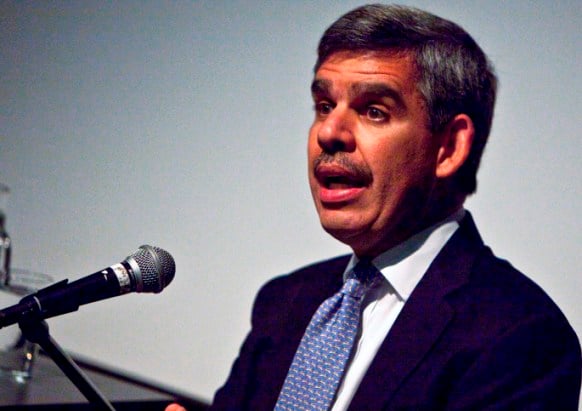Pimco boss says country's high savings rate, repatriation of overseas capital will help country overcome disaster
Japanese investors will repatriate funds as the nation seeks to recover from its strongest earthquake on record, said Mohamed El-Erian, chief executive officer at Pacific Investment Management Co.
“We know that inflation will spike because of shortages and because of supply chain disruptions, and we know that the deficit and public debt are going to increase significantly,” El-Erian, who's also co-chief investment officer, said in a telephone interview on “Bloomberg Surveillance” with Tom Keene. “Fortunately, Japan is a rich economy, and the private sector has saved a lot. Japan can navigate this.”
Japanese Prime Minister Naoto Kan called for calm today as the world's most indebted developed country battled to cool three quake-damaged nuclear reactors with seawater and Tokyo shoppers stripped water, food and batteries from supermarket shelves. Chief Cabinet Secretary Yukio Edano said radiation readings outside reactors rocked by explosions were falling below levels that are harmful, while a fire at a separate unit appeared to have been put out.
Stocks plunged and Japan's Nikkei 225 index posted its biggest two-day drop since 1987 after the news that a third explosion and fire struck Tokyo Electric Power Co.'s Fukushima plant, and supermarkets reported panic buying. Hundreds of thousands of people without power faced freezing temperatures after Japan's strongest earthquake on record last week caused a 7-meter (23 foot) tsunami that engulfed the northeast coast.
The yen rose for the third day against all of its major counterparts as speculation increased that demand for the currency may increase as insurance companies and lenders use it to rebuild.
“The critical issue is whether the private sector repatriates its capital -- a lot of it is held abroad,” El- Erian said. “And I suspect that it will.”
The Bank of Japan added 5 trillion yen to the financial system in a one-day operation today. BOJ Governor Masaaki Shirakawa has pledged to keep pouring cash into the economy to stabilize markets. The bank injected 15 trillion yen ($6 billion) yesterday and doubled its asset-purchase program to 10 trillion yen, an increase that's about one-tenth the size of the Fed's program of buying Treasuries.
The Topix slid 9.5 percent at the close, following a 7.5 percent drop yesterday. Japan's currency rose 0.9 percent to 80.90 per dollar. Bonds halted a two-day rally, sending 10-year yields 1.5 basis points higher to 1.215 percent.
There are investment opportunities in “solid countries” where prices have declined, El-Erian said. He didn't specify what securities Pimco purchased since the disasters in Japan prompted havoc in global financial markets.
Bill Gross, the co-chief investment officer with El-Erian and founder of Pimco, has urged investors to reduce holdings of Treasuries and U.K. gilts and buy higher-returning securities such as debt from emerging-market nations such as Brazil.
Gross last month increased holdings of emerging-market debt to 10 percent in his $237 billion Total Return Fund, the highest level since October, from 9 percent in January.
Pimco, based in Newport Beach, California, is the world's biggest manager of bond funds and oversees more than $1 trillion in assets.
--Bloomberg News--







